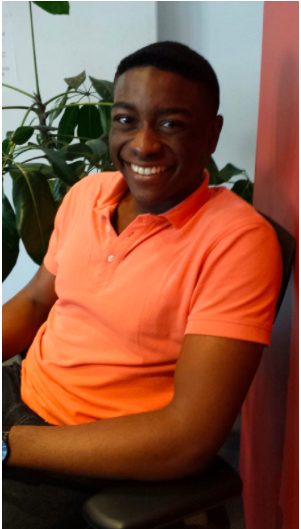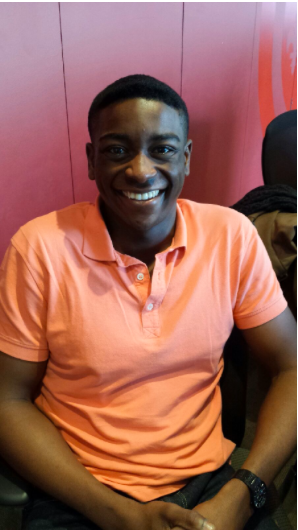
Senior Shama Ams became the first-ever St. John’s student to receive a Marshall scholarship, a prestigious international award that will fund his graduate studies at the School of Oriental and African Studies at the University of London.
Ams, a McNair scholar and recipient of a Thomas R. Pickering Fellowship, has committed himself to researching and promoting the importance of public health institutions in maintaining health in developing nations.

Shama Ams is the recent winner of the prestigious Marshall Scholarship. The scholarship will fund his graduate studies at the School of Oriental and African Studies at the University of London.
As a result of his dedication on the subject, he was awarded the scholarship dedicated to former U.S. Secretary of State George C Marshall, which was only given to 34 out of 979 applicants, according to 2014 Marshall Scholarship statistics report.
He explains, his research which began as an assignment for Fred Cocozzelli’s class in Comparative Political Systems, evolved from a 12-page comparative analysis between Lagos, Nigeria and New York to a 40-page piece that now includes Johannesburg to argue that the involvement in public health institutions will reduce the risk of infectious disease, particularly with AIDS and HIV.
Cocozzelli, a professor in the Government and Politics department, who worked with Ams during the summer after his sophomore year to develop an abstract, described Ams’ first draft as methodologically advanced.
“Right away, he was figuring out how to work with variables, how to work in the language of social science,” Cocozzelli said.
Ams is grateful to Cocozzelli for granting him “a way to think about healthcare,” when, at the time, he was only sure of his interest in the issue.
While at the University of London, Ams said he hopes to work alongside Dr. Michael Jennings, whose research is on moving healthcare forward by focusing on the necessary collaboration between Non-Governmental Organizations and governments. This aligns with Ams’ interest for researching whether public health institutions can promote the best practices to reduce the risk of infectious diseases as a result of implementing anti-poverty measures.
However, Ams emphasizes his interests lie in informing policy, not necessarily finding solutions.
“My interest isn’t necessarily finding a cure-all as it is trying to use the existing infrastructure to solve problems that are solveable,” Ams said. “Corruption prevents its own capacity in these countries from bearing fruit and then so piecing apart many of these issues, variable-by-variable, is what I am really interested in doing and providing powerful explanations that can hopefully inform policy and drive this new narrative that can hopefully promote new solutions.”
The Texas-native, born to Nigerian parents, went on a homecoming trip with them before starting college for a medical mission to Jos, Nigeria. He said the trip revealed missing government contribution and public health officials coupled with an abundance of NGOs in a city with rampant poverty and disease. The lack of infrastructure was among many problems that Ams realized were too “large-scale” for NGOs to handle and contributed to his focus on government institutional involvement.
When he graduates from the University of London, Ams will still be bound to his contract with the State Department as provided by the Pickering Fellowship, and will serve as a Foreign Service Officer in a country that will be determined by a combination of
demand and Ams’ skills and preference.
His professional trajectory began with the McNair Scholars program, intended to prepare undergraduate students for a PhD program, which Ams said provided the “competitiveness” for the Public Policy and International Affairs Program Fellowship that allowed him to participate in the 2013 Junior Summer Institute at the Woodrow Wilson School of Public and International Affairs (PPIA), according to the Office of Marketing and Communications.
That experience then provided the competitiveness for the Pickering Fellowship, which finally ended with the Marshall Scholarship awarded in November, Ams said.
Junior Pedro Alfonso, who has known Ams for two years while working at the University Writing Center, said Ams has always found the means to fulfill the expectations of his schooling and his research in a way “far beyond anything [he] has ever seen.”
“He popped out a paper at like 4 a.m. and hopped on a plane at 9 a.m. [to go] present his paper and came back and finished something else,” Alfonso said. “It was crazy, but he managed to do it all.”
Alfonso said he has found inspiration in Ams to pursue scholarships and fellowships, including the PPIA.
“That’s one thing I really value about being a friend of Shama,” Alfonso said. “He has always tried to help me and steer me in the right direction – to push me and push my intellect.”
Cocozzelli explains Ams’ ability to imagine himself in important situations and doing important things is essential to achieve success because it provides “some sort of tangible example.”
Moreover, Cocozzelli called attention to Ams “talent” in building relationships that will work to his advantage as he associates with people in his advanced research abroad.
“Shama’s overwhelming strength that we should all be so lucky to have is that he is just the most personable guy,” Cocozzelli said. “He talks to you. You can put him in almost any room and he can talk to almost anybody.”
In an approach that has driven his successes, Ams applies a tangibility to his goals that, along with the urgency for solutions and change, fuels his confidence to achieve them.
“There is no room for doubt,” Ams said. “And I see myself as part of this larger effort to make incremental change and hopefully impact full change.”







